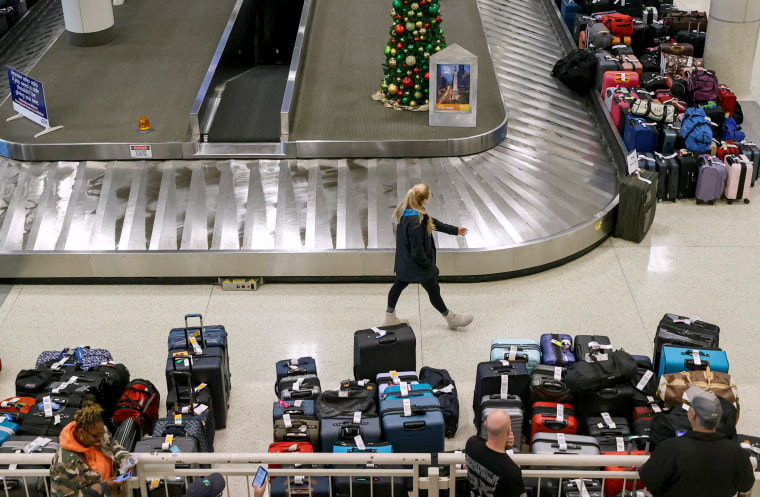The holiday weekend turned into the Christmas nightmare for thousands of travelers when a massive storm caused extensive flight delays and cancellations. But for passengers of Southwest Airlines, the nightmare continued days after other airlines had returned to normal. On Thursday, the airline was still plagued with massive problems, canceling more than 2,300 flights, nearly 60% of the day’s scheduled flights.
Southwest’s problems went far beyond the typical weather-related flight delays and cancellations that we are all accustomed to.
Southwest’s problems went far beyond the typical weather-related flight delays and cancellations that we are all accustomed to. The massive meltdown was apparently caused by Southwest’s own mistakes, from the unique way the airline staffs flight crews to, as experts note, outdated information technology that has not changed much since the 1990s. That is a big reason why on Wednesday nearly 90% of all canceled flights were from just one airline.
This prompted several Democratic members of Congress to demand legislative action to better protect the public when flying, including Rep. Katie Porter, who tweeted that it’s time to pass her bill that “fines airlines 10x the original price for not promptly issuing a refund” within 20 days as currently mandated by federal regulations. As Porter noted, airlines are “rarely” penalized for failing to meet the 20-day refund window.
Transportation Secretary Pete Buttigieg also slammed Southwest, telling NBC News that the airline’s mass delays and cancellations “clearly crossed the line from what’s an uncontrollable weather situation to something that is the airline’s direct responsibility.” Buttigieg added, “At a minimum, there needs to be cash refunds for the canceled flights, and they need to be taking care of passengers where they got stuck — with meals, with hotels compensation.” Given both the bad press and the fact that Buttigieg raised the threat of fines against Southwest, the airline jumped into action.
Southwest Airlines CEO Bob Jordan released a video apologizing to passengers, and an airline spokesperson announced Southwest would “honor reasonable requests for reimbursement for meals, hotel, and alternate transportation”— although he did not specify a dollar amount nor a definition of “reasonable” expenses.
But what are your rights to compensation when an airline makes a mistake that causes significant flight delays or cancellations that don’t attract headlines like we saw this week with Southwest? The Transportation Department website sums it up bluntly: “Contrary to popular belief, for domestic itineraries airlines are not required to compensate passengers whose flights are delayed or canceled.”
It continues: “There are no federal laws requiring airlines to provide passengers with money or other compensation when their flights are delayed.” The best the Transportation Department can offer is that you “ask airline staff if they will pay for meals or a hotel room.” That means you must rely on the kindness of massive airlines, many of which saw billions in profits in 2021, to help you out.
The Transportation Department website explains that the airline is not even required to get you on another carrier’s flight to your destination, even if seats are open. But the Transportation Department tells passengers it “does not hurt to politely ask your airline if it will transfer your ticket to another airline.” So, if you are really polite to the employees of these multinational corporations, you may get the chance to get to where you are going.
Late last year a group of Democratic senators reintroduced legislation to establish something called the Airline Passengers’ Bill of Rights that would “ensure that airlines provide passengers with fair compensation, refunds, recourse in the event of airline-caused flight delays and cancellations,” and more. One of the sponsors of the legislation, Sen. Richard Blumenthal, D-Conn., summed it up well when introducing the bill: “As passengers are nickel-and-dimed at every turn, the airline industry has raked in billions.”
One provision of the bill would mandate that in the event of flight delays of more than four hours caused by the carrier, the airline must “provide ticket refunds, alternate transportation, compensation, and cover the cost of meals and lodging (as applicable).” The legislation also “cracks down on airlines using weather as an excuse for delays and cancellations that are actually the airlines’ fault” and would improve the “process for passengers to submit airline complaints and forces airlines to address concerns quickly.”
There’s little to no chance to get 10 Republican senators to join with Democrats to enact legislation that imposes more regulations on big corporations that could eat into their profits.
Unfortunately, this legislation went nowhere in the Senate. Given the 60-vote filibuster requirement to even bring a bill to a vote, there’s little to no chance to get 10 Republican senators to join with Democrats to enact legislation that imposes more regulations on big corporations that could eat into their profits.
Perhaps that is why the Transportation Department this fall proposed new federal regulations that would entitle passengers to refunds if domestic flights were delayed more than three hours. But even these proposed regulations fall well short of providing fair compensation to passengers for expenses caused by delays or flight cancellations. (Adding to the concerns about new Transportation Department regulations is that the GOP-controlled U.S. Supreme Court would strike them down given its June decision making it clear it wants to rein in agencies from promulgating new sweeping regulations.)
It’s long past time that we have guaranteed rights when it comes to the companies raking in billions from taking us up into “the friendly skies.” The Airline Passengers’ Bill of Rights would be a big step in treating passengers not like revenue-generating cargo but like actual human beings.

